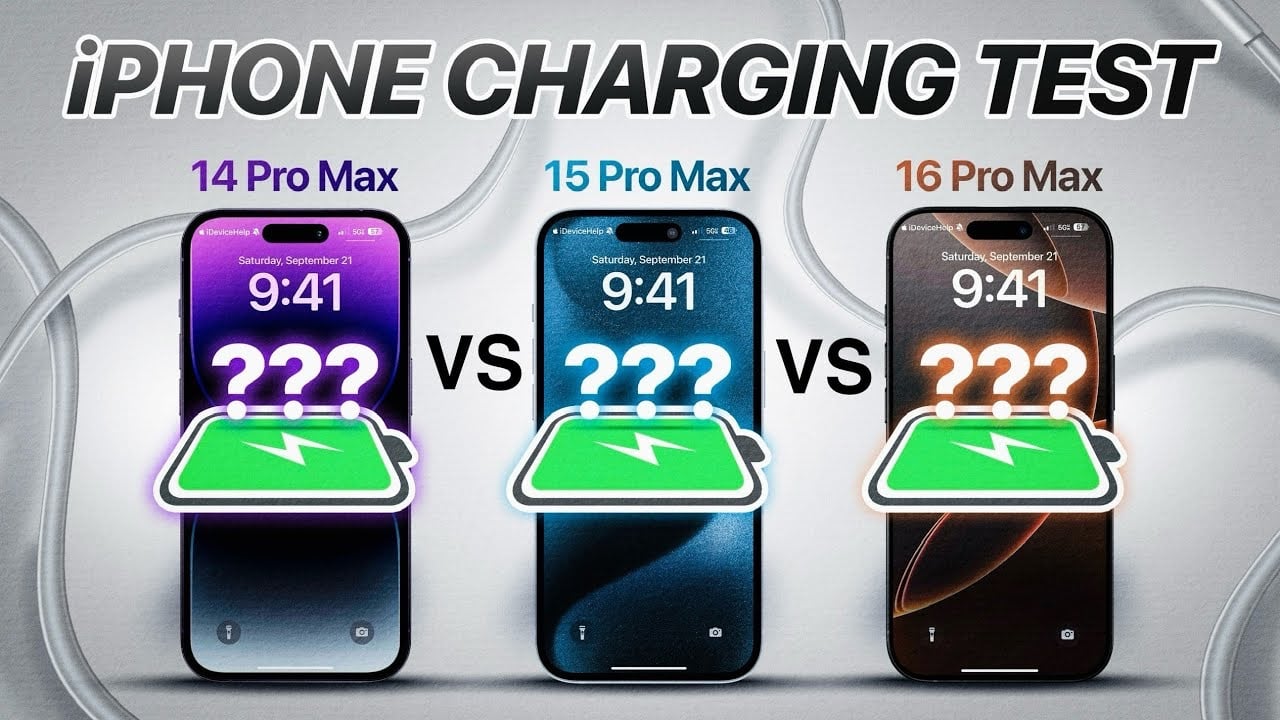The iPhone 16 Pro Max, Apple’s latest flagship smartphone, features impressive features and capabilities. One of the most notable improvements is its support for up to 45 watts of wired charging, which promises to deliver faster charging times compared to its predecessors. To put this claim to the test, a comprehensive charging speed comparison was conducted, pitting the iPhone 16 Pro Max against the iPhone 15 Pro Max and iPhone 14 Pro Max.
Methodology
To ensure a level playing field, the test involved three devices: the iPhone 16 Pro Max, iPhone 15 Pro Max, and iPhone 14 Pro Max. All three smartphones were completely drained of battery power before the test commenced. A 70-watt power adapter was used consistently across all devices to eliminate any variations in charging performance due to different power adapters.
The charging progress of each device was closely monitored and recorded at three key intervals: 30 minutes, 1 hour, and 1 hour 30 minutes. These intervals were chosen to provide a comprehensive understanding of the charging behavior over time.
Results
The charging speed test yielded the following results:
iPhone 16 Pro Max How Fast Does it Charge?
30 Minutes
After 30 minutes of charging, the iPhone 16 Pro Max and iPhone 15 Pro Max both reached a charge level of 51%, while the iPhone 14 Pro Max lagged slightly behind at 48%. This initial observation suggests that the newer models have a slight edge in terms of charging speed right from the start.
1 Hour
- iPhone 16 Pro Max: 82%
- iPhone 15 Pro Max: 81%
- iPhone 14 Pro Max: 80%
At the one-hour mark, the iPhone 16 Pro Max maintained its lead, reaching an impressive 82% charge level. The iPhone 15 Pro Max followed closely at 81%, while the iPhone 14 Pro Max reached 80%. The gap between the devices remained relatively small, indicating consistent charging performance across all models.
1 Hour 30 Minutes
- iPhone 16 Pro Max: 99%
- iPhone 15 Pro Max: 96%
- iPhone 14 Pro Max: 96%
After 1 hour and 30 minutes of charging, the iPhone 16 Pro Max achieved a near-full charge at 99%, while both the iPhone 15 Pro Max and iPhone 14 Pro Max reached 96%. The difference in charging speed became more apparent towards the end of the charging cycle, with the iPhone 16 Pro Max pulling slightly ahead.
Analysis
The charging speed test revealed that the iPhone 16 Pro Max indeed charges slightly faster than its predecessors, the iPhone 15 Pro Max and iPhone 14 Pro Max. However, the difference in charging speed is not as significant as one might expect, given the higher wattage capability of the iPhone 16 Pro Max.
It is important to note that factors such as battery capacity, charging algorithms, and power management systems also play a crucial role in determining the overall charging performance of a device. While the iPhone 16 Pro Max supports up to 45 watts of wired charging, the actual charging speed may be optimized to ensure the longevity and safety of the battery.
Summary
The iPhone 16 Pro Max showcased a marginal improvement in charging speed compared to the iPhone 15 Pro Max and iPhone 14 Pro Max. While it did charge slightly faster, the difference was not substantial enough to be considered a catalyst. All three models reached similar charge levels within the same time frame, indicating that the higher wattage capability of the iPhone 16 Pro Max did not translate into significantly faster charging in real-world usage.
For users who prioritize fast charging, the iPhone 16 Pro Max offers a slight advantage. However, those who already own an iPhone 15 Pro Max or iPhone 14 Pro Max may not find the charging speed improvement compelling enough to upgrade solely based on this factor.
As smartphone technology continues to evolve, it will be interesting to see how Apple further optimizes the charging capabilities of future iPhone models to strike a balance between speed, efficiency, and battery longevity.
Source & Image Credit: iDeviceHelp
Filed Under: Apple, Apple iPhone, Top News
Latest TechMehow Deals
Disclosure: Some of our articles include affiliate links. If you buy something through one of these links, TechMehow may earn an affiliate commission. Learn about our Disclosure Policy.
